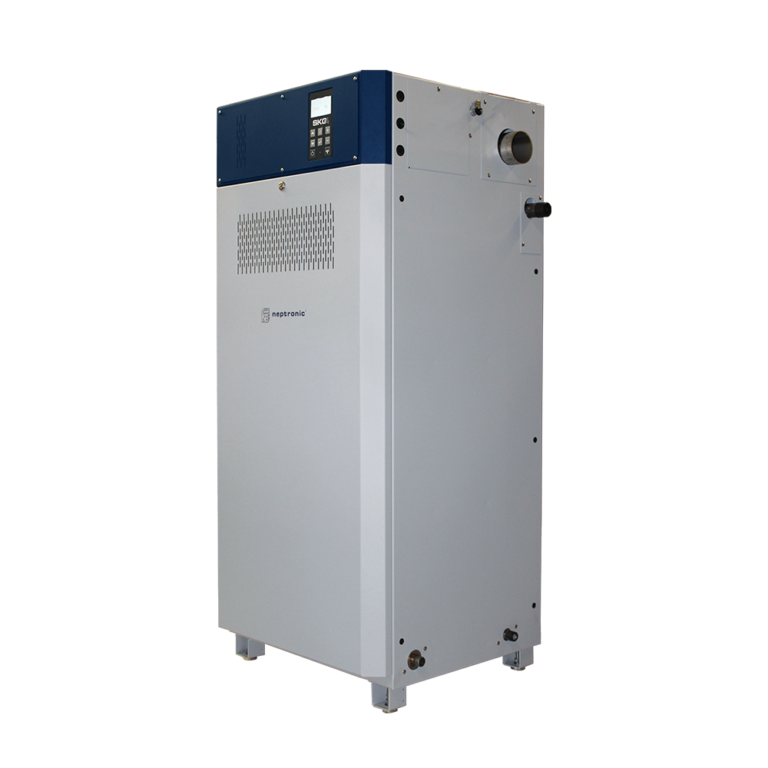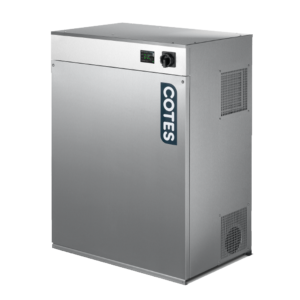
Brewing any kind of alcohol is a complex and multi-faceted craft. There are a lot of different factors to take into account, and the entire process from start to finish is very sensitive to environmental conditions. This means that carefully controlled temperatures and conditions are often crucial for many stages of the brewing process, from mixing the ingredients at the beginning, to how the end product is stored. But with high sensitivity comes a lot of problems, which require a lot of care to solve.
Problems In Breweries
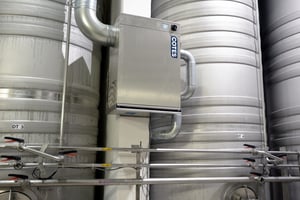
The air outside of a brewery is, almost inevitably, full of water vapour. This water vapour is constantly fluctuating, with the amount of water vapour changing with the weather, the season and even the time of day. This
is known as ‘humidity’, and it’s one of the (many) reasons the UK weather can feel so different day by day, even if the temperature stays the same.
When this water vapour enters the building holding the pipes, tanks and other structures used by breweries, it quickly turns into condensation and moisture. In such a sensitive environment, this causes a number of issues, including:
- Condensation forming and pooling on vessels, pipes, equipment, cold surfaces and even floors
- Corrosion and other damage to buildings, structures, fittings and equipment
- Bacterial growth and mould, resulting in hygiene issues and compliance difficulties
- Problems attaching labels to bottles due to the excessive moisture
- Higher servicing and maintenance costs as a direct result of uncontrolled humidity
All of these are generally annoying and inconvenient, and can cause delays or even a complete stop in production. But one of them is particularly unpleasant, and can actually cause a lot of hygiene problems – a big nono in the manufacture of any consumable product. And that issue is mould.
If mould develops in a brewery’s storage rooms, it can cause stains, nasty smells, material damage, and can even lead to health problems for the room’s occupants. While the mould isn’t acutely harmful, the long-term effects can be, so it should be taken very seriously. In addition to the damage and destruction of the labels used in your brewery, mould is a sure symptom of moisture problems and a clear sign of moisture problem and a bad indoor climate – since a very high level of humidity is required in the room for mould to grow.
It goes without saying that this is an unhygienic situation, and it only gets worse with any steam cleaning you do for the equipment – since this creates even more uncontrolled moisture in the air, and while things might look clean immediately after, they probably won’t stay that way. Fans, ventilation and air conditioning are rarely the answer to this, because all they do is replace one body of air and uncontrolled humidity with another – with just as little control.
How Dehumidification Helps
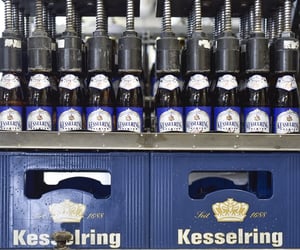 For the unique ecosystems of breweries, we recommend desiccant dehumidification technologies. This type of dehumidification enables brewery to maintain control over air conditions at every stage of production and storage.
For the unique ecosystems of breweries, we recommend desiccant dehumidification technologies. This type of dehumidification enables brewery to maintain control over air conditions at every stage of production and storage.
Desiccant dehumidification is a specialist technology, and is used to determine the dew point of the air so that condensation (and all the problems it causes) simply can’t form in the first place. When the relative humidity is brought below 65% at 20 oC, condensation problems will be completely eliminated.
Humidity Solutions offers specialist humidity control advice and equipment for a wide range of industrial and commercial applications. We are the exclusive UK distributor for Cotes AS, a Danish manufacturer of high-quality desiccant dehumidifiers. These systems have been designed and installed in a number of breweries throughout Europe, where master brewers have previously tried different solutions to solve these problems with no success. But after deciding on dehumidification to control the air humidity, the issues clear up very quickly, never to return.
We chose the Cotes range of desiccant dehumidifiers to promote in the UK due to their reputation for quality and reliability. They are compact and robust units, available with automated precision control systems, compliant with good hygiene practice, and are energy-efficient with minimal operating costs – which makes them an ideal solution. They also feature a unique add-on heat recovery module, which makes them the only humidity management solutions able to comply with the most stringent energy requirements currently in force anywhere.
A Case Study
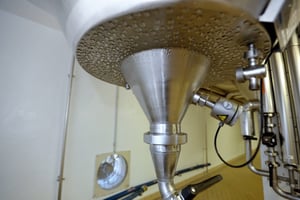 We spoke with Dirk Stapper from the Ernst Barre private brewery in Germany, who had experience of this kind of issue. Before a desiccant dryer was installed, the air humidity in the pressure tank cellar in the brewery sometimes reached values of over 80%rH, which could even be seen in the masonry of the building. He said:
We spoke with Dirk Stapper from the Ernst Barre private brewery in Germany, who had experience of this kind of issue. Before a desiccant dryer was installed, the air humidity in the pressure tank cellar in the brewery sometimes reached values of over 80%rH, which could even be seen in the masonry of the building. He said:
“We had major problems with the formation of condensate and the tanks started to ‘sweat’ after filling. Our steel tanks are coated on the inside but have shown corrosion due to the moisture in the outside area. Before we installed the dehumidifier, mould always formed in the room which we naturally wanted to prevent. We tried different vaporizers to distribute the air in the room and it was a big effort that didn’t work in the end”[/vc_column_text][/vc_column][vc_column width=”1/3″][vc_single_image image=”4249″ img_size=”full”][/vc_column][/vc_row][vc_row][vc_column][vc_column_text]But just by installing a desiccant dehumidification system, Dirk was able to see an improvement after just a few days. The relative humidity in the brewery’s pressure tank cellar quickly reduced from over 80% to below 60% very quickly, and this started combating the mould and other issues very rapidly.
The impact of excessive humidity in breweries are far reaching and expensive for the master brewer and the company. With a humidity of over 80%, mould growth is often an issue in basements and warehouses. Although this rarely leads to direct health damage, breweries have to take mould seriously, because it’s a clear sign if bad indoor climate and excessive humidity in their manufacturing and storage environment. This problem can temporarily be solved by removing mould in individual cases, but if you don’t focus on controlling the source of the humidity, you run the risk of these moisture related issues coming back time and time again. By dehumidifying the air through the desiccant technology, the brewer not only avoids condensation, corrosion and mould, but also ensures a good indoor climate, better hygiene conditions and a healthy working environment.
Just get in touch with the team at Humidity Solutions today.
